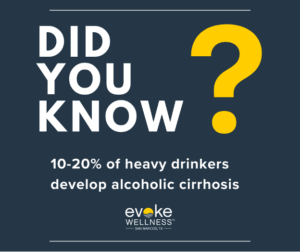You wake up each morning feeling like you’ve been hit by a truck. Your skin is yellow, your belly is swollen, and you’re coughing up blood. These are signs of advanced alcohol cirrhosis, a disease that kills over 20,000 Americans each year. You know you need to stop drinking, but each time you try the painful detox and cravings drive you back to the bottle. Take heart. With the right treatment program, you can overcome your addiction and halt the progression of this deadly disease. In this article, learn about alcohol detox, addiction treatment programs like residential treatment and outpatient therapy, and how to get the comprehensive support you need to regain your health and reclaim your life. Together, we’ll explore the path to healing.
If you or a loved one is considering treatment, Evoke Wellness at San Marcos invites you to contact us. Our compassionate team is ready to answer your questions, discuss your needs, and help you take the first steps toward recovery. At Evoke Wellness, you will find more than just a treatment program – you’ll discover a community dedicated to your wellness and success. Together, let’s embrace the journey to recovery and the promise of a new beginning. Call us at (833) 503-0734 today or reach out online.
What Is Alcohol Cirrhosis?
Alcohol cirrhosis is a severe and potentially life-threatening condition caused by excessive alcohol consumption over many years. It involves permanent scarring and damage to the liver, which can lead to liver failure.
Irreversible Liver Damage
As the liver becomes increasingly scarred, it has difficulty performing vital functions like:
- Removing toxins from the body
- Producing essential proteins
- Regulating blood clotting
Seek Treatment Urgently
If you or a loved one exhibit symptoms like jaundice, abdominal pain, nausea or fatigue – seek medical treatment immediately. Early intervention through alcohol detox, rehab and lifestyle changes can help stop cirrhosis progression and potentially reverse some liver damage.
Symptoms of Alcohol Cirrhosis
As alcohol abuse progresses, your liver becomes increasingly damaged and scarred – this condition is known as cirrhosis. Early symptoms can be vague, but become more severe as the disease advances.
Common Signs
- Fatigue and weakness
- Loss of appetite
- Nausea and vomiting
- Weight loss
Visible Changes
- Yellowing of the skin and eyes (jaundice)
- Swelling in the legs and abdomen
- Reddened palms
- Visible spider-like blood vessels
Severe Complications
In advanced cirrhosis, life-threatening issues like internal bleeding, hepatic encephalopathy (brain impairment), liver cancer, and liver failure can occur. Seeking medical treatment is crucial to managing symptoms and preventing fatal outcomes.
Causes and Risk Factors for Alcohol Cirrhosis
Excessive Alcohol Consumption
The primary cause of alcohol-related cirrhosis is long-term, heavy alcohol use. With each drink, your liver has to work harder to filter out toxins. Over time, this undue strain can lead to permanent scarring and irreversible damage.
Genetic Factors
Some individuals are genetically predisposed to developing cirrhosis, even with moderate drinking. Genetics can affect how efficiently your body processes alcohol and metabolizes its byproducts.
Other Risk Factors
- Obesity
- Viral hepatitis infections
- Autoimmune liver diseases
- Exposure to environmental toxins
The risk increases substantially when multiple factors are present. Early diagnosis and lifestyle changes can help prevent progression to end-stage liver disease.
Diagnosing Alcohol Cirrhosis
Physical Examination
During a physical exam, your doctor will check for signs of cirrhosis, such as an enlarged liver or swollen abdomen. They may also look for jaundice (yellowing of the skin and whites of the eyes), redness on the palms, and enlarged veins in the abdomen.
Blood Tests
Liver function tests can detect abnormal levels of enzymes and proteins, indicating liver damage or disease. Complete blood count can reveal anemia or platelet deficiencies linked to cirrhosis.
Imaging Tests
An ultrasound, CT scan, or MRI can show liver size and identify cirrhosis or its complications. These tests also help rule out other causes of liver disease.
Liver Biopsy
In some cases, a small tissue sample from the liver is examined under a microscope for scarring or other signs of cirrhosis. This is the most definitive way to diagnose cirrhosis and determine its cause.
Early diagnosis is crucial for managing alcohol cirrhosis effectively. Don’t ignore persistent symptoms – see your doctor right away for proper testing and treatment.
Treating Alcohol Cirrhosis
Alcohol Detox
The first crucial step is safely withdrawing from alcohol through medically-supervised detox. This allows your body to eliminate alcohol and break physical dependence under 24/7 care to manage potentially dangerous withdrawal symptoms.
Residential Rehab Program
After detox, you transition into a residential treatment program. This provides a structured therapeutic environment to address the psychological aspects of alcoholism through counseling, education and support.
Therapy for Recovery
Various evidence-based therapies are utilized, such as cognitive behavioral therapy to modify harmful thoughts and behaviors related to drinking. Family therapy programs help rebuild strained relationships impacted by alcohol abuse. Group sessions connect you with others on the recovery journey, providing encouragement and accountability.
The comprehensive, multidisciplinary approach at an accredited alcohol treatment center gives you the tools and support system to achieve long-term sobriety after cirrhosis.
Preventing Alcohol Cirrhosis
Lifestyle Changes
Alcohol cirrhosis is a serious, life-threatening condition caused by excessive alcohol consumption over many years. To prevent its onset, make lifestyle changes to reduce your alcohol intake. Cut back gradually and seek medical help if needed for safe detox.
Diet and Exercise
Eating a nutrient-rich diet and exercising regularly can help support liver health. Focus on foods like fruits, vegetables, whole grains and lean proteins. Stay hydrated and avoid processed, high-fat items.
Regular Checkups
Get routine liver function tests done to monitor your liver enzymes. Early detection of liver issues allows for timely treatment and prevention of further damage. Don’t ignore potential warning signs like jaundice or abdominal pain.
Alcohol Cirrhosis: Frequently Asked Questions
What causes cirrhosis?
- Excessive alcohol consumption over many years is the primary cause of alcohol-related cirrhosis.
- Binge drinking further increases your risk of developing this chronic liver disease.
How common is it?
- Alcohol-related liver disease is one of the leading causes of cirrhosis in the United States.
- An estimated 19,504 people died from alcohol-related liver disease in 2019.
What are the symptoms?
Common symptoms include:
- Fatigue and weakness
- Loss of appetite
- Nausea and vomiting
- Abdominal pain and bloating
Can cirrhosis be reversed?
- Early-stage cirrhosis is potentially reversible if you stop drinking and make lifestyle changes.
- However, once the liver sustains too much scarring, the damage becomes permanent and irreversible.
Conclusion
You now have a deeper understanding of alcohol cirrhosis and the various treatment options available. While the journey to recovery can feel daunting, take comfort knowing you do not have to walk it alone. By seeking professional help through detox, rehab, therapy programs, and support groups, you or your loved one can overcome alcohol addiction. Have hope for the future, take things one day at a time, and believe that a sober life is possible. Though the road ahead has challenges, it also holds great joy if you stay committed to your health and wellbeing. You have the power within you – now is the time to harness it.
Begin Your Journey with Evoke Wellness at San Marcos
If you or a loved one is considering treatment, Evoke Wellness at San Marcos invites you to contact us. Our compassionate team is ready to answer your questions, discuss your needs, and help you take the first steps toward recovery. At Evoke Wellness, you will find more than just a treatment program – you’ll discover a community dedicated to your wellness and success. Together, let’s embrace the journey to recovery and the promise of a new beginning. Call us at (833) 503-0734 today or reach out online.



